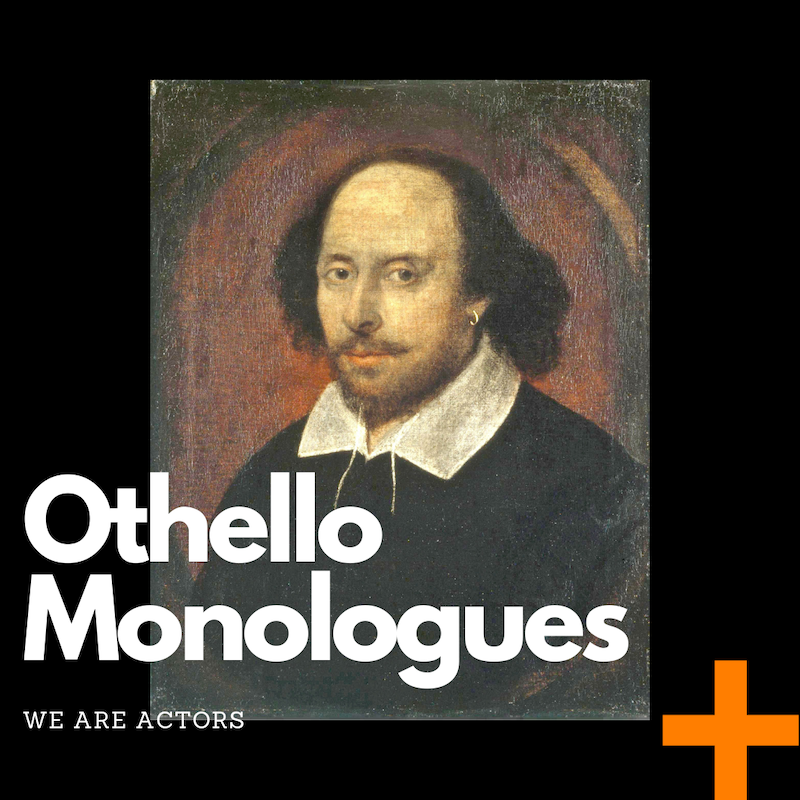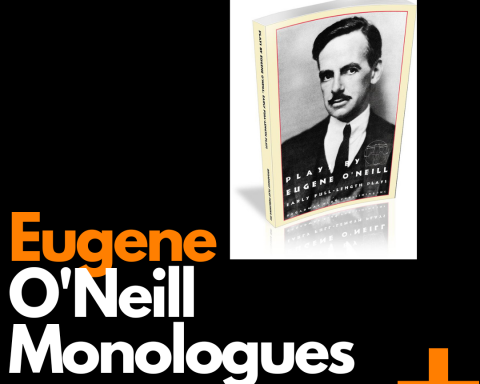
Ever been overlooked for a promotion? Been made to feel jealous of a potentially cheating spouse? Plotted revenge on your boss? Yes? Then you’ll love this compilation of Othello monologues from one of Shakespeare’s most action packed tragedies. Weather you’re a villainous aspiring Iago, a philosophizing Emilia, a bewildered and earnestly loving wife like Desdemona or a blinded by jealous rage, Othello, you’ll surly find a speech to suit your word to the action and action to the word!
Have fun looking through these 12 Othello Monologues we have picked for you to work on. Have a great rehearsal!
- Iago – Act 1, Scene 1
Three great ones of the city,
In personal suit to make me his lieutenant,
Off-capp’d to him: and, by the faith of man,
I know my price, I am worth no worse a place:
But he; as loving his own pride and purposes,
Evades them, with a bombast circumstance
Horribly stuff’d with epithets of war;
And, in conclusion, Nonsuits my mediators;
for, ‘Certes,’ says he, ‘I have already chose my officer.’
And what was he? Forsooth, a great arithmetician,
One Michael Cassio, a Florentine,
A fellow almost damn’d in a fair wife;
That never set a squadron in the field,
Nor the division of a battle knows
More than a spinster; unless the bookish theoric,
Wherein the toged consuls can propose
As masterly as he: mere prattle, without practise,
Is all his soldiership. But he, sir, had the election:
And I, of whom his eyes had seen the proof
At Rhodes, at Cyprus and on other grounds
Christian and heathen, must be be-lee’d and calm’d
By debitor and creditor: this counter-caster,
He, in good time, must his lieutenant be,
And I—God bless the mark!—his Moorship’s ancient.
2. Iago Act 1, Scene 1
O, sir, content you;I follow him to serve my turn upon him:
We cannot all be masters, nor all masters
Cannot be truly follow’d. You shall mark
Many a duteous and knee-crooking knave,
That, doting on his own obsequious bondage,
Wears out his time, much like his master’s ass,
For nought but provender, and when he’s old, cashier’d:
Whip me such honest knaves. Others there are
Who, trimm’d in forms and visages of duty,
Keep yet their hearts attending on themselves,
And, throwing but shows of service on their lords,
Do well thrive by them and when they have lined their coats
Do themselves homage: these fellows have some soul;
And such a one do I profess myself. For, sir,
It is as sure as you are Roderigo,
Were I the Moor, I would not be Iago:
In following him, I follow but myself;
Heaven is my judge, not I for love and duty,
But seeming so, for my peculiar end:
For when my outward action doth demonstrate
The native act and figure of my heart
In compliment extern, ’tis not long after
But I will wear my heart upon my sleeve
For daws to peck at: I am not what I am.
3. Roderigo Act 1, Scene 1
Sir, I will answer any thing. But, I beseech you,
If’t be your pleasure and most wise consent,
As partly I find it is, that your fair daughter,
At this odd-even and dull watch o’ the night,
Transported, with no worse nor better guard
But with a knave of common hire, a gondolier,
To the gross clasps of a lascivious Moor—
If this be known to you and your allowance,
We then have done you bold and saucy wrongs;
But if you know not this, my manners tell me
We have your wrong rebuke. Do not believe
That, from the sense of all civility,
I thus would play and trifle with your reverence:
Your daughter, if you have not given her leave,
I say again, hath made a gross revolt;
Tying her duty, beauty, wit and fortunes
In an extravagant and wheeling stranger
Of here and every where. Straight satisfy yourself:
If she be in her chamber or your house,
Let loose on me the justice of the state
For thus deluding you.
4. Othello Act 1, Scene 3
Her father loved me; oft invited me;
Still question’d me the story of my life,
From year to year, the battles, sieges, fortunes,
That I have passed.
I ran it through, even from my boyish days,
To the very moment that he bade me tell it;
Wherein I spake of most disastrous chances,
Of moving accidents by flood and field
Of hair-breadth scapes i’ the imminent deadly breach,
Of being taken by the insolent foe
And sold to slavery, of my redemption thence
And portance in my travels’ history:
Wherein of antres vast and deserts idle,
Rough quarries, rocks and hills whose heads touch heaven
It was my hint to speak,—such was the process;
And of the Cannibals that each other eat,
The Anthropophagi and men whose heads
Do grow beneath their shoulders. This to hear
Would Desdemona seriously incline:
But still the house-affairs would draw her thence:
Which ever as she could with haste dispatch,
She’ld come again, and with a greedy ear
Devour up my discourse: which I observing,
Took once a pliant hour, and found good means
To draw from her a prayer of earnest heart
That I would all my pilgrimage dilate,
Whereof by parcels she had something heard,
But not intentively: I did consent,
And often did beguile her of her tears,
When I did speak of some distressful stroke
That my youth suffer’d. My story being done,
She gave me for my pains a world of sighs:
She swore, in faith, twas strange, ’twas passing strange,
‘Twas pitiful, ’twas wondrous pitiful:
She wish’d she had not heard it, yet she wish’d
That heaven had made her such a man: she thank’d me,
And bade me, if I had a friend that loved her,
I should but teach him how to tell my story.
And that would woo her. Upon this hint I spake:
She loved me for the dangers I had pass’d,
And I loved her that she did pity them.
This only is the witchcraft I have used:
Here comes the lady; let her witness it.
5. Iago Act 1, Scene 3
Thus do I ever make my fool my purse:
For I mine own gain’d knowledge should profane,
If I would time expend with such a snipe.
But for my sport and profit. I hate the Moor:
And it is thought abroad, that ‘twixt my sheets
He has done my office: I know not if’t be true;
But I, for mere suspicion in that kind,
Will do as if for surety. He holds me well;
The better shall my purpose work on him.
Cassio’s a proper man: let me see now:
To get his place and to plume up my will
In double knavery—How, how? Let’s see:—
After some time, to abuse Othello’s ear
That he is too familiar with his wife.
He hath a person and a smooth dispose
To be suspected, framed to make women false.
The Moor is of a free and open nature,
That thinks men honest that but seem to be so,
And will as tenderly be led by the nose As asses are.
I have’t. It is engender’d. Hell and night
Must bring this monstrous birth to the world’s light.
6. Desdemona Act 3, Scene 3
Why, then, to-morrow night; or Tuesday morn;
On Tuesday noon, or night; on Wednesday morn:
I prithee, name the time, but let it not
Exceed three days: in faith, he’s penitent;
And yet his trespass, in our common reason—
Save that, they say, the wars must make examples
Out of their best—is not almost a fault
To incur a private cheque. When shall he come?
Tell me, Othello: I wonder in my soul,
What you would ask me, that I should deny,
Or stand so mammering on. What! Michael Cassio,
That came a-wooing with you, and so many a time,
When I have spoke of you dispraisingly,
Hath ta’en your part; to have so much to do
To bring him in! Trust me, I could do much,—
Why, this is not a boon;
‘Tis as I should entreat you wear your gloves,
Or feed on nourishing dishes, or keep you warm,
Or sue to you to do a peculiar profit
To your own person: nay, when I have a suit
Wherein I mean to touch your love indeed,
It shall be full of poise and difficult weight
And fearful to be granted.
7. Desdemona Act 4, Scene 2
O good Iago, What shall I do to win my lord again?
Good friend, go to him; for, by this light of heaven,
I know not how I lost him. Here I kneel:
If e’er my will did trespass ‘gainst his love,
Either in discourse of thought or actual deed,
Or that mine eyes, mine ears, or any sense,
Delighted them in any other form;
Or that I do not yet, and ever did.
And ever will—though he do shake me off
To beggarly divorcement—love him dearly,
Comfort forswear me! Unkindness may do much;
And his unkindness may defeat my life,
But never taint my love. I cannot say ‘whore:’
It does abhor me now I speak the word;
To do the act that might the addition earn
Not the world’s mass of vanity could make me.
8. Emilia Act 4, Scene 3
But I do think it is their husbands’ faults
If wives do fall: say that they slack their duties,
And pour our treasures into foreign laps,
Or else break out in peevish jealousies,
Throwing restraint upon us; or say they strike us,
Or scant our former having in despite;
Why, we have galls, and though we have some grace,
Yet have we some revenge. Let husbands know
Their wives have sense like them: they see and smell
And have their palates both for sweet and sour,
As husbands have. What is it that they do
When they change us for others? Is it sport?
I think it is: and doth affection breed it?
I think it doth: is’t frailty that thus errs?
It is so too: and have not we affections,
Desires for sport, and frailty, as men have?
Then let them use us well: else let them know,
The ills we do, their ills instruct us so.
9. Iago Act 2, Scene 1
That Cassio loves her, I do well believe it;
That she loves him, ’tis apt and of great credit:
The Moor, howbeit that I endure him not,
Is of a constant, loving, noble nature,
And I dare think he’ll prove to Desdemona
A most dear husband. Now, I do love her too;
Not out of absolute lust, though peradventure
I stand accountant for as great a sin,
But partly led to diet my revenge,
For that I do suspect the lusty Moor
Hath leap’d into my seat; the thought whereof
Doth, like a poisonous mineral, gnaw my inwards;
And nothing can or shall content my soul
Till I am even’d with him, wife for wife,
Or failing so, yet that I put the Moor
At least into a jealousy so strong
That judgment cannot cure. Which thing to do,
If this poor trash of Venice, whom I trash
For his quick hunting, stand the putting on,
I’ll have our Michael Cassio on the hip,
Abuse him to the Moor in the rank garb—
For I fear Cassio with my night-cap too—
Make the Moor thank me, love me and reward me.
For making him egregiously an ass
And practising upon his peace and quiet
Even to madness. ‘Tis here, but yet confused:
Knavery’s plain face is never seen tin used.
Iago Act 2, Scene 1
Touch me not so near:I had rather have this tongue cut from my mouth
Than it should do offence to Michael Cassio;
Yet, I persuade myself, to speak the truth
Shall nothing wrong him. Thus it is, general.
Montano and myself being in speech,
There comes a fellow crying out for help:
And Cassio following him with determined sword,
To execute upon him. Sir, this gentleman
Steps in to Cassio, and entreats his pause:
Myself the crying fellow did pursue,
Lest by his clamour—as it so fell out—
The town might fall in fright: he, swift of foot,
Outran my purpose; and I return’d the rather
For that I heard the clink and fall of swords,
And Cassio high in oath; which till to-night
I ne’er might say before. When I came back—
For this was brief—I found them close together,
At blow and thrust; even as again they were
When you yourself did part them.
More of this matter cannot I report:
But men are men; the best sometimes forget:
Though Cassio did some little wrong to him,
As men in rage strike those that wish them best,
Yet surely Cassio, I believe, received
From him that fled some strange indignity,
Which patience could not pass.
10. Iago Act 2, Scene 3
And what’s he then that says I play the villain?
When this advice is free I give and honest,
Probal to thinking and indeed the course
To win the Moor again? For ’tis most easy
The inclining Desdemona to subdue
In any honest suit: she’s framed as fruitful
As the free elements. And then for her
To win the Moor—were’t to renounce his baptism,
All seals and symbols of redeemed sin,
His soul is so enfetter’d to her love,
That she may make, unmake, do what she list,
Even as her appetite shall play the god
With his weak function. How am I then a villain
To counsel Cassio to this parallel course,
Directly to his good? Divinity of hell!
When devils will the blackest sins put on,
They do suggest at first with heavenly shows,
As I do now: for whiles this honest fool
Plies Desdemona to repair his fortunes
And she for him pleads strongly to the Moor,
I’ll pour this pestilence into his ear,
That she repeals him for her body’s lust;
And by how much she strives to do him good,
She shall undo her credit with the Moor.
So will I turn her virtue into pitch,
And out of her own goodness make the net
That shall enmesh them all.
11. Othello Act 4, Scene 2
Had it pleased heaven
To try me with affliction; had they rain’d
All kinds of sores and shames on my bare head.
Steep’d me in poverty to the very lips,
Given to captivity me and my utmost hopes,
I should have found in some place of my soul
A drop of patience: but, alas, to make me
A fixed figure for the time of scorn
To point his slow unmoving finger at!
Yet could I bear that too; well, very well:
But there, where I have garner’d up my heart,
Where either I must live, or bear no life;
The fountain from the which my current runs,
Or else dries up; to be discarded thence!
Or keep it as a cistern for foul toads
To knot and gender in! Turn thy complexion there,
Patience, thou young and rose-lipp’d cherubin,—
Ay, there, look grim as hell!
O, ay; as summer flies are in the shambles,
That quicken even with blowing. O thou weed,
Who art so lovely fair and smell’st so sweet
That the sense aches at thee, would thou hadst
ne’er been born!
Was this fair paper, this most goodly book,
Made to write ‘whore’ upon? What committed!
Committed! O thou public commoner!
I should make very forges of my cheeks,
That would to cinders burn up modesty,
Did I but speak thy deeds. What committed!
Heaven stops the nose at it and the moon winks,
The bawdy wind that kisses all it meets
Is hush’d within the hollow mine of earth,
And will not hear it. What committed!
Impudent strumpet!
12. Othello Act 5, Scene 2
Behold, I have a weapon;
A better never did itself sustain
Upon a soldier’s thigh: I have seen the day,
That, with this little arm and this good sword,
I have made my way through more impediments
Than twenty times your stop: but, O vain boast!
Who can control his fate? ’tis not so now.
Be not afraid, though you do see me weapon’d;
Here is my journey’s end, here is my butt,
And very sea-mark of my utmost sail.
Do you go back dismay’d? ’tis a lost fear;
Man but a rush against Othello’s breast,
And he retires. Where should Othello go?
Now, how dost thou look now? O ill-starr’d wench!
Pale as thy smock! when we shall meet at compt,
This look of thine will hurl my soul from heaven,
And fiends will snatch at it. Cold, cold, my girl!
Even like thy chastity. O cursed slave!
Whip me, ye devils,
From the possession of this heavenly sight!
Blow me about in winds! roast me in sulphur!
Wash me in steep-down gulfs of liquid fire!
O Desdemona! Desdemona! dead!
Oh! Oh! Oh!










